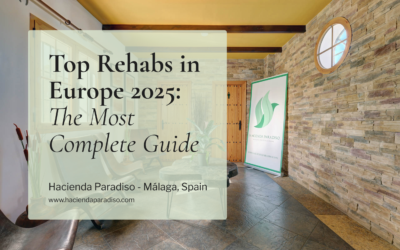Last updated: November, 2025
Addiction is not a matter of weak willpower or moral failure: it is a complex brain disorder. It involves changes in the areas responsible for motivation, decision-making, reward, and emotional regulation. Understanding these changes is essential for families, caregivers, and therapists who want to support recovery effectively.
At Hacienda Paradiso, we combine evidence-based therapies with a natural environment to help individuals retrain their brains, restore emotional balance, and regain control of their lives. Our residential therapy programme in Málaga offers a structured, compassionate setting where the mind and body can begin to heal.
The Reward Circuit and Dopamine
Dopamine is often called the “feel-good” neurotransmitter because it plays a central role in motivation, pleasure, and learning. In a healthy brain, dopamine is released during naturally rewarding experiences such as eating, socializing, exercising, or achieving goals.
In addiction, substances or behaviors trigger excessive and rapid dopamine release, bypassing the brain’s natural reward system. Over time, the brain becomes desensitized: normal rewards feel less satisfying, while cravings for the addictive substance or behavior intensify.
For example, someone addicted to alcohol may no longer enjoy social gatherings or hobbies, yet experiences strong cravings when exposed to alcohol-related cues. Supporting recovery involves rebuilding this natural reward system. Encouraging activities that naturally boost dopamine (like exercise, creative projects, volunteering, or setting small personal goals) helps restore healthy motivation patterns.
Regular positive reinforcement from trusted relationships and a structured rehabilitation program strengthens these new patterns over time, making recovery more sustainable.
Serotonin and Emotional Regulation
Serotonin regulates mood, anxiety, sleep, and impulse control. Chronic addiction disrupts serotonin levels, often leading to irritability, depression, and emotional instability. This imbalance increases the risk of relapse and makes emotional regulation more difficult.
Restoring serotonin balance requires healthy routines, therapy, and exposure to positive experiences that stabilize mood and improve self-control. Simple habits such as consistent sleep, balanced nutrition, and mindfulness exercises can make a significant difference.
A daily mindfulness practice or peaceful walk in nature can reduce anxiety and gradually restore emotional equilibrium. In our therapeutic environment, residents learn to rebuild healthy serotonin levels through gentle routines that promote calmness and inner stability.
Neuroplasticity: The Brain’s Capacity to Heal
One of the most hopeful aspects of addiction recovery is neuroplasticity, the brain’s ability to form new connections and rewire itself. Even after years of addiction, new neural pathways can emerge to support healthier habits and decision-making.
Therapies like Cognitive Behavioral Therapy (CBT), mindfulness, and structured daily routines accelerate this healing process. Environments that reduce stress and provide safety, predictability, and positive reinforcement are crucial for neuroplastic recovery.
For instance, a person engaging in regular exercise and group therapy may gradually replace addictive behaviors with rewarding, positive routines. Consistency is key: small, repeated actions over time build strong new neural pathways that reinforce stability and self-control.
At our addiction treatment center in Málaga, neuroplasticity-based approaches are woven into every rehabilitation program, helping residents retrain their brains toward lasting change.
How Addiction Changes Decision-Making
Addiction affects the prefrontal cortex, the area responsible for planning, self-control, and long-term thinking. This often increases impulsivity and reduces the ability to assess risks accurately, leading individuals to prioritize short-term pleasure over long-term well-being.
Recovery involves retraining the prefrontal cortex through therapy, reflection, and consistent practice. Activities such as journaling, structured goal-setting, and guided problem-solving strengthen executive function and decision-making capacity.
Therapists often use real-life examples and reflection exercises to help individuals rebuild trust in their own judgment. Over time, this process restores confidence and supports sustainable behavioral change.
Supporting Someone in Recovery
Supporting a loved one through addiction recovery requires understanding, patience, and structure. Providing a calm, predictable environment helps reduce stress, while promoting natural sources of reward (such as hobbies, social connections, or creative projects) can reinforce progress.
Avoiding blame and judgment is essential, as shame often triggers relapse. Instead, celebrate small achievements to reinforce new habits and build self-esteem.
Engaging in shared healthy activities (like cooking, walking, or art) creates positive association and emotional connection. These moments, though small, contribute to restoring balance and mutual trust during the recovery journey.
The Role of Hacienda Paradiso
At Hacienda Paradiso, we integrate clinical expertise with a natural, eco-friendly environment to optimize brain recovery. Our residential therapy center in Málaga provides safety, structure, and professional support tailored to each individual’s needs.
The serene surroundings reduce stress and improve mood, naturally supporting dopamine and serotonin regulation. Our combination of individual therapy, group sessions, mindfulness practices, and physical activity promotes neuroplasticity and rebuilds healthy brain pathways.
Every aspect of our rehabilitation programs is designed to nurture both emotional and neurological healing, guiding residents toward a sustainable and balanced recovery.
Where Healing Begins
Addiction changes the brain, but recovery is not only possible, it is the brain’s natural response to healing. By understanding the roles of dopamine, serotonin, and neuroplasticity, families and therapists can provide meaningful support that helps individuals rebuild motivation, control, and emotional stability.
Recovery is a continuous process of learning and renewal. With the right environment, compassionate guidance, and consistent effort, the addicted brain can regain balance and thrive again.
Frequently Asked Questions: Addicted Brain and Recovery
Yes. Through neuroplasticity, the brain can reorganize and form new, healthy neural connections. Although this process takes time, consistent therapy, structured routines, and supportive environments accelerate recovery. Individuals who engage in regular therapy, physical activity, and mindful practices often experience improved mood, focus, and self-control within months. Neuroplastic changes can continue for years, reinforcing long-term stability and preventing relapse. At Hacienda Paradiso, residents receive continuous support designed to maximize this natural capacity for brain healing.
There is no fixed timeline because recovery depends on the substance used, the duration of addiction, and personal factors such as mental health and environment. Generally, noticeable improvements in mood and cognitive clarity appear within the first few months of abstinence. However, deeper neurological recovery may take six months to several years. Structured rehabilitation programs and ongoing therapy help accelerate progress, offering tools to maintain stability and prevent setbacks throughout the recovery journey.
Activities that stimulate natural dopamine and serotonin production—like exercise, art, music, journaling, and spending time in nature—are highly beneficial. Cognitive exercises, such as puzzles or goal-setting, also strengthen the prefrontal cortex. Combining these activities with therapy and a healthy routine promotes both physical and emotional recovery. Simple actions, repeated daily, are the foundation of sustainable brain healing and resilience.
Family members can play a key role by providing understanding, structure, and emotional safety. Avoiding criticism or unrealistic expectations is crucial, as shame can reinforce addictive cycles. Instead, encourage small victories and celebrate progress. Attending family therapy sessions helps relatives learn supportive communication and boundary-setting techniques. At Hacienda Paradiso, family involvement is integrated into many rehabilitation programs to create a foundation of trust and stability.
Residential therapy in Málaga offers a peaceful, natural setting that enhances the healing process. The Mediterranean climate, outdoor spaces, and holistic lifestyle promote relaxation and neurochemical balance. In centers like Hacienda Paradiso, residents benefit from 24-hour support, personalized therapy, and wellness-focused routines. The combination of professional treatment and serene surroundings helps individuals recover faster, rebuild self-awareness, and sustain long-term sobriety.










